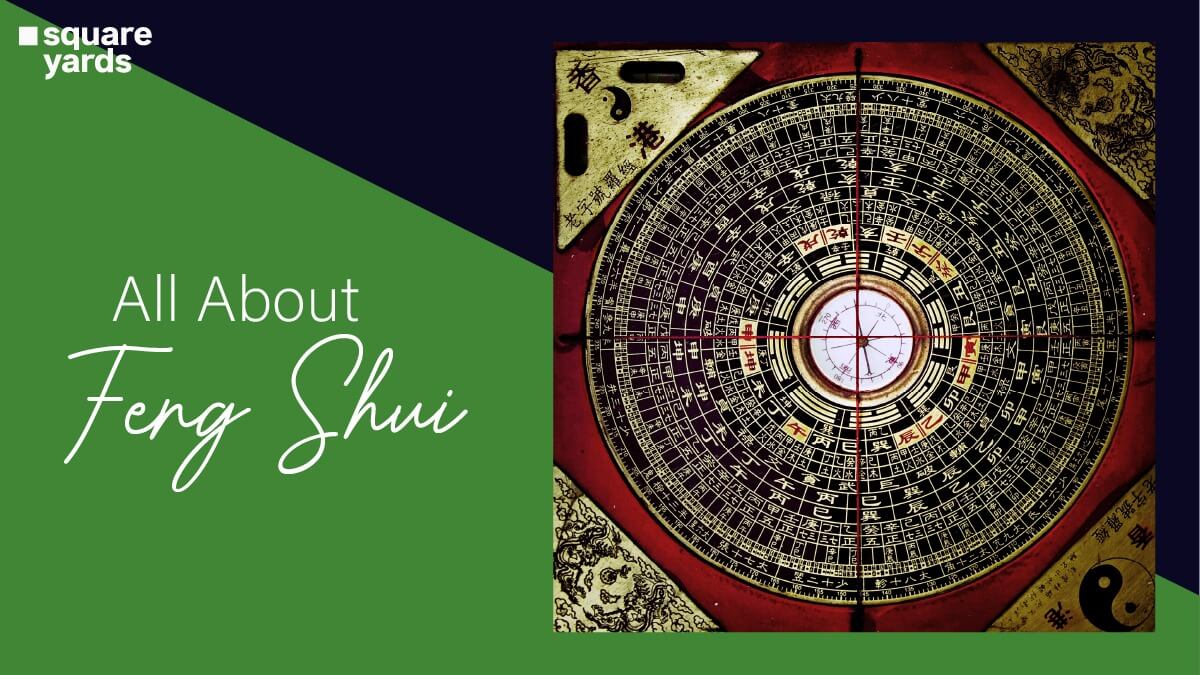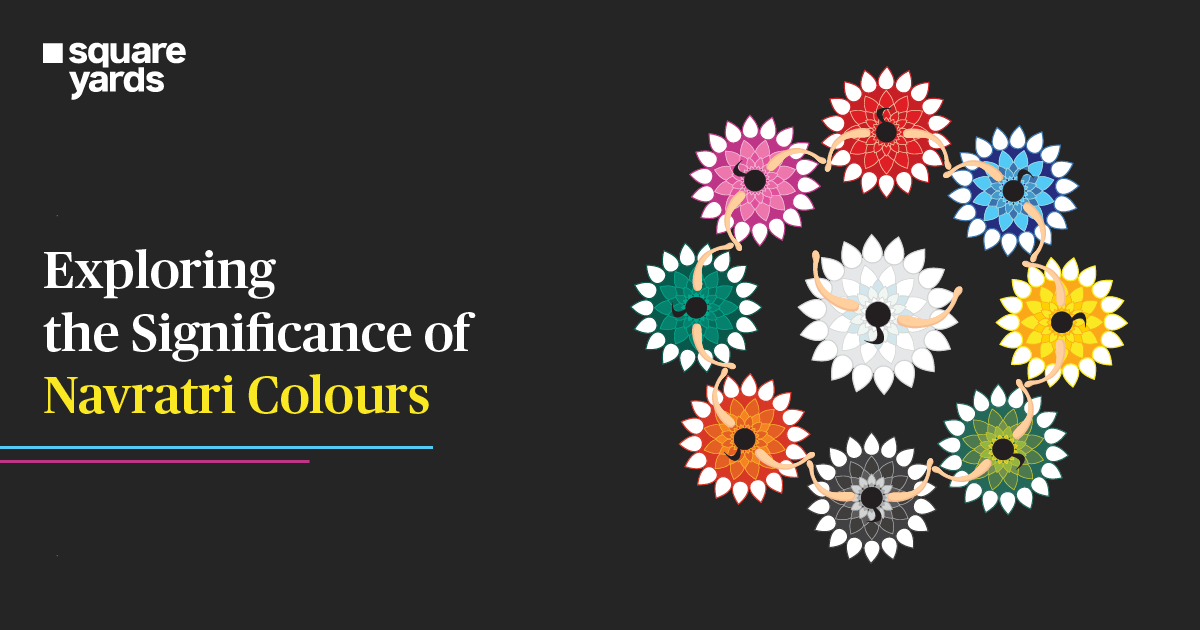Feng Shui is a traditional practice which is explained as an ancient art for balancing your life and welcoming fortune. This historic art and science have developed in the past 3000 years in China. It is mainly the interaction of humans and their environment that allows you to interact with these energies and obtain particular life improvements. Feng shui talks about balancing the powers of any given space to ensure good fortune and health for those practising it. So, if you also want to welcome health and fortune your way, then learn feng shui from the basics to have an in-depth understanding of it. Feng Shui has been discussed in detail below, from its history and benefits to its elements and dos and don’ts. Make a note of it!
Table of contents
What is Feng Shui?
The Chinese feng shui meaning in its literal form is ‘feng’ means wind and ‘shui’ means water. In Chinese feng shui culture, wind and water are both related to good health. The term feng shui is also known as Chinese geomancy, which claims to utilise energy forces to harmonise individuals with their environment. Feng shui covers the broader aspects and includes astrological, cosmological, astronomical, geographical, architectural, and topographical dimensions. Moreover, Feng Shui is determined as scientific and pseudoscientific by scientists and philosophers, which means it operates the world in ways that aren’t compilable via scientific approach.
Origin and History of Feng Shui
Feng shui is an ancient Chinese philosophy which translates as ‘wind and water,’ that dates back thousands of years. It originated with the early settlement of people who settled to grow crops surrounded by farm animals. It was first used to determine the safest areas where families could thrive, as well as the best burial places for relatives and others. It was later used to locate palaces, government structures, and other public monuments. Whole cities were designed and built with core feng shui concepts in mind.
Feng shui continued to be an essential part of Chinese culture until today, when communism momentarily banned it due to its more mystical elements. The Chinese used it to their advantage in the making of the Bank of China building in Hong Kong, seemingly aware of its capability to help businesses and individuals thrive.
Feng shui has evolved into a precise, all-encompassing assessment of man-made and natural environments. An equal consideration in present times has been the way the earth’s energy influences places and how those places impact their occupants.
In the past, the cultural paradigms of China, with its unique geography and social structure, fundamentally shaped Feng Shui from generation to generation. Therefore, the impact of feng shui is not entirely dependent on its traditional aspects and can be varied with different knowledge resources to meet the particular needs of people and places throughout the world.
Benefits of Feng Shui
Chinese feng shui is based on the fact that every object that surrounds an individual influences their lives. Feng shui explains how a minimal change could help you promote happiness, good health, prosperity, positivity, passion, and zeal for life. Therefore, the simplest method to begin with this healthy transformation is to transform your home or workplace. Below, we have jotted down multiple benefits of feng shui that you can claim at any time.
Career and Wealth Corners of FengShui
- Keep the doors and windows open.
- Welcome plants to your home or workplace to boost the ambience with their natural and positive energy.
- Declutter your desk or room and keep it tidy.
- Keep a fish aquarium or any water feature and ensure the water flows.
- All old items and broken elements from your home must be removed.
Love-Life and Relationships
- Declutter your space.
- Keep things in pairs, for instance, chairs.
- Add colourful or happy couple paintings.
- Use a linen fabric bedsheet and keep it clean.
- Bring fresh blossoms to your home.
- Use fragrances and light candles.
- Eliminate stuffed animals and extra pillows from your room.
Health Benefits
- Allow sunlight and fresh air into your room and workspace.
- Add flowers and plants as per feng shui to keep the freshness intact.
- Do not put the mirror in front of your bed.
- Put up bright lights.
Draw Luck and Prevent Negativity
- Bring evil to your place.
- Put in a snake plant, peace lily, or a spider plant.
- Remove the broken items from your location.
- Keep the proper flow of air and light; open windows.
Earth Elements of Feng Shui
Feng Shui is made up of five elements, which include wood, fire, earth, metal, and water. All these elements are to be activated for different reasons. Thus, if you want to activate the earth element, let’s first understand what this element represents.
The earth in feng shui represents knowledge, stability, and health. This is also strongly associated with all sorts of relationships. Therefore, if you want to improve your relationships and want to chase peace and love, then you need to activate the earth element. Be at ease. You can simply activate this element by following the below tips.
- You can activate the earth element by eating food that grows deep in the soil, for instance, potatoes, carrots, yams, and many others that grow beneath the earth.
- Colour can also be used to enhance the earth element; simply incorporate earthy colours such as orange, yellow, or brown into your surroundings. You can add these colours through your home decor preferences just by adding a brown rug or by adding a yellow statement to your living room couch.
- You can also activate the earth element by adding wooden furniture like a coffee table or a chair.
- You can enhance the earth element at your place by adding any square or flat matter made up of heavy objects, such as ceramic or stone.
Following the above tips will enhance the stability and help channel positivity in your home and life.
Dos and Don’ts for a Perfect Feng Shui Home
Do’s
- Do use soothing colours like off-white, cream, or peach.
- Do place your bed correctly, like in front of the door.
- Do make sure you have plenty of air and light in your home, so keep your windows open for sunlight and air.
Dont’s
- Do not keep the doors open at night as it lets the positive energy escape your place.
- Do not keep electronics in the bedroom, such as a TV, phone, or laptop, because the light from their screens interrupts the sleep pattern.
- Do not decorate your bedroom with water features, mirrors, or plants because plants have strong energy, which might unbalance the ambience, and mirrors are believed to reflect the energy around you, which can interrupt sleep.
Worried About Your Home Vastu – Have Vastu Consultant Advice for Your Home
Over to You
This article led you through the understanding of Chinese feng shui, from its origin and elements to its different benefits. So, now when you have a great understanding of how feng shui items enhances your life and surroundings, it is up to you to practise and welcome improvements just by following simple and healthy feng shui tips. Wait no more and brighten your home with a lively life, be it professional or personal.
Stories you may also like
| Study Room Vastu Tips |
| East Facing House Vastu Plan |
| Vastu For Toilets Bathrooms |
| North East Facing House |
| Vastu Tips For Wealth And Happiness |
| Vastu Tips For Broom |
FAQs
What are the basic rules of feng shui?
The five basic rules of feng shui include knowing your colours, following the Bagua map, finding the right elements, being organised, and separating a resting and work area.
How do I feng shui my home?
Check your commanding positions, declutter the entryway, keep everything clean, incorporate metal, add plants, and remove obstacles to feng shui your home.
What does feng shui literally mean?
The literal meaning of feng shui is wind-water, i.e., fluid. As per the historical time the water bodies and landscapes were thought to direct the flow of the universe.
Is Feng Shui a real thing?
Feng shui is a Chinese geomancy that claims to utilise the energy forces to harmonise individuals and bring balance to their lives.
Dos and don'ts in feng shui?
The Dos and Don’ts of Feng Shui include removing store books from the bedroom; not leaving broken objects alone; and always keeping your surroundings clean.
What should you not do in feng shui?
As per feng shui, you must not use mirrors in the bedroom, say goodbye to electronics, get rid of all the clutter, and many more.





















































